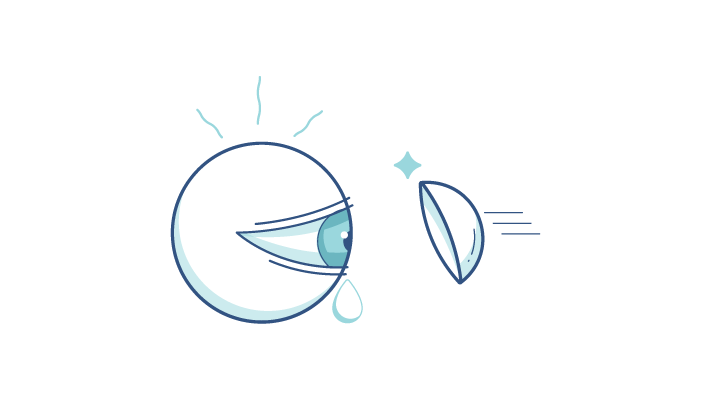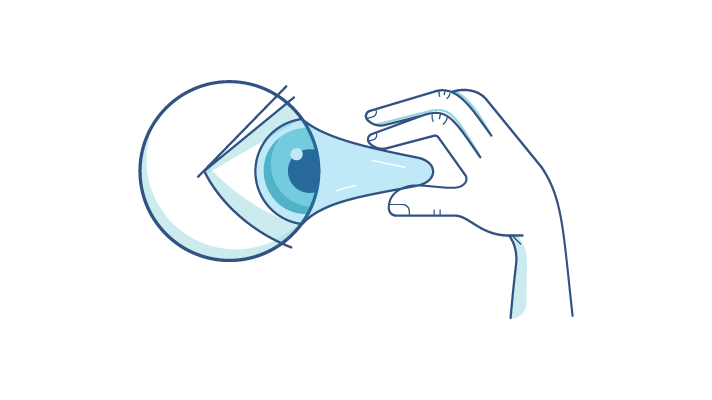Getting to the bottom of contact lens myths
There are a few common misconceptions about contact lenses that keep some people from giving them a try. We'll help you separate fact from fiction so that you can relax and enjoy all the ways contact lenses can improve your life.
Myths about how contact lenses can affect your eyes

Myth: Contact lenses can scratch your eyes
Contact lens related problems can occur, however this is very unlikely. Most common contact lens eye-health issues are related to poorly fitted lenses or not following your eye care professional recommended lens wear schedule. If you experience any unusual eye discomfort or changes to your vision while wearing your contact lenses, remove them immediately and call your eye care professional.

Myth: Contact lenses can get stuck to your eyes
Contact lenses are generally easy to remove using the method your eye care professional recommends. If they temporarily stick, use a few drops of lens solution to help loosen them up.
Myth: Contact lenses are uncomfortable
Often people ask if contact lenses are uncomfortable, but unlike some of the early contact lenses, most of the modern contact lenses are thin and soft, making them more comfortable to wear. Most contact lenses are made from moisture-rich materials that're breathable & you won't even know you're wearing them.
Myth: Contact lenses are difficult to look after
With daily disposable contact lenses you simply discard them after use and start with a fresh pair the next day. If you have reusable daily wear contact lenses, the cleaning routine with modern solutions is fairly simple, and with some practice as well as following instructions from your eye care professional, it quickly becomes second nature. Learn how to take care of your lenses with our practical guide.
Myth: Your eyes need a regular day off of contact lenses to 'breathe'
Most of the modern, soft contact lenses are made from breathable materials. Unless your eye care professional has instructed you otherwise, you should be able to wear your contact lenses every day.
Myth: Contact lenses can't correct for astigmatism

People with astigmatism can enjoy contact lenses. For ACUVUE®, this is thanks to our Eyelid Stabilised design which helps keep the contact lenses aligned as you blink for clear, stable vision1 ACUVUE® offers several contact lenses that correct for astigmatism.
Myths about who can wear contact lenses
Footnotes
#All ACUVUE® contact lenses have UV Blocking to help provide protection against transmission of harmful UV radiation to the cornea and into the eye. UV absorbing contact lenses are NOT substitutes for protective UV absorbing eyewear such as UV absorbing goggles or sunglasses because they do not completely cover the eye and surrounding area. You should continue to use UV absorbing eyewear as directed by your eye care professional. **While contact lenses are perfect for an active lifestyle, it is not advised to expose your contact lenses to water, and as such swimming with contact lenses should be avoided. This includes avoiding wearing contact lenses not just while swimming, but also showering, bathing and using a hot tub.
1.JJV Data on File 2021. ACUVUE® Contact Lenses for ASTIGMATISM - Overall Fitting Success, Orientation Position, Rotational Stability, and Vision Performance.
Important information for contact lens wearers: ACUVUE® Contact Lenses can be used for vision correction. An Eye Care Professional will determine whether contact lenses are right for you. Although rare, serious eye problems can develop while wearing contact lenses. To help avoid these problems, follow the wear and replacement schedule and instructions on proper lens care. Do not wear contact lenses if you have an eye infection, any eye disease or systemic disease, that may affect the eye, or if you are allergic to any ingredients. If you experience eye discomfort, excessive tearing, vision changes, redness or other eye problems, remove the lens and contact your Eye Care Professional immediately. For more information, including warnings and precautions, carefully read the Instructions for Use available on the Johnson & Johnson website.
PP2023MLT6108

